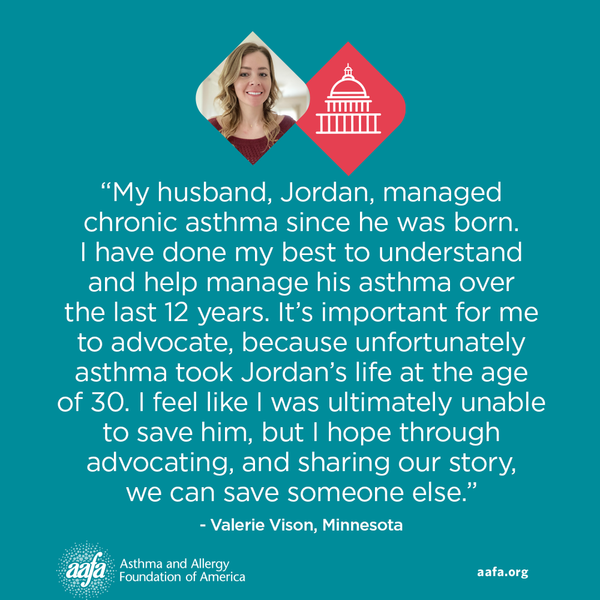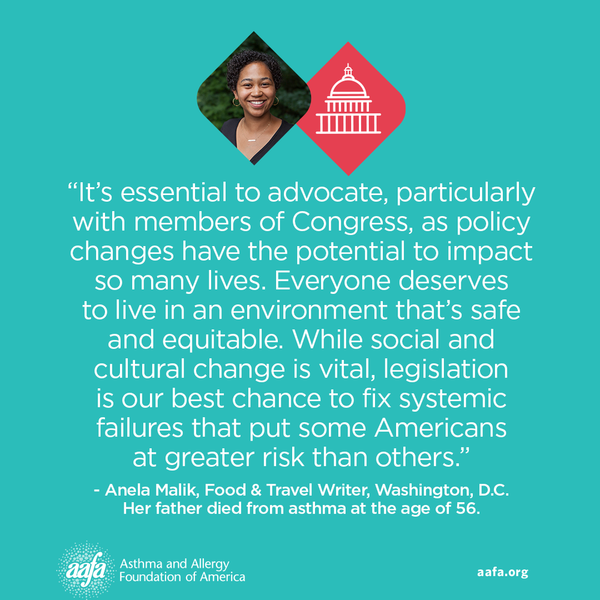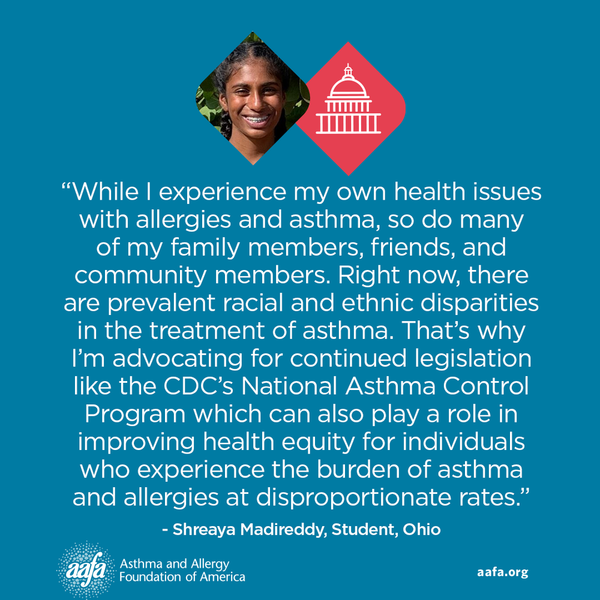As part of our advocacy efforts for people with asthma and allergies, the Asthma and Allergy Foundation of America (AAFA) visits Congress every year. We invite patients and advocates from across the U.S. to let Congress know what policies can help improve the lives of people managing allergic diseases.
Meetings were held on Zoom this year due to the COVID-19 pandemic. The meetings focused on the urgent need to fix the nation’s health disparities gap. AAFA’s theme for this year’s meetings was “Zoom-In on Health Equity.”
Advocates, AAFA Chapter members, and AAFA leadership told Congress about the impact asthma and allergies have on all of our lives. We also talked about the huge toll of racial and ethnic disparities. This year AAFA is asking Congress to support laws that continues to improve research, prevention, treatment, and access to care to save lives and promote health equity.
AAFA provided a bi-partisan group of elected officials with 19 different public policy suggestions. The suggestions came from our Asthma Disparities in America report. Community advocates and members of AAFA’s leadership also encouraged Congress to support four specific priorities. These include:
- $35 million in funding for the National Asthma Control Program (NACP)
- Elijah E. Cummings Family Asthma Act
- Improving Social Determinants of Health Act (S. 104/H.R. 379)
- Black Maternal Health Momnibus Act (S. 346/ H.R. 959)
Black Americans are three times more likely to die from asthma. They are five times more likely to visit emergency rooms for asthma compared to white Americans.
The statistics for food allergies are similar. Black children are 7% more likely to have food allergies overall compared to white children. Pacific Islander, Native Hawaiian, and Asian children are 25% more likely to have food allergies. Black children with food allergies are also more likely to die from anaphylaxis, a severe allergic reaction, than white children with food allergies.
“These statistics are and should be startling,” shared patient advocate Valerie Vison of Minnesota. Valerie’s husband, Jordan, died from asthma. Learning he had a greater chance of death as a Black American, Valerie honors his life by joining other advocates in raising awareness.

“My husband, Jordan, managed chronic asthma since he was born. I have done my best to understand and help manage his asthma over the last 12 years. It’s important for me to advocate, because unfortunately asthma took Jordan’s life at the age of 30. I feel like I was ultimately unable to save him, but I hope through advocating, and sharing our story, we can save someone else.”
−Valerie Vison, Minnesota

It's essential to advocate, particularly with members of Congress, as policy changes have the potential to impact so many lives. Everyone deserves to live in an environment that's safe and equitable. While social and cultural change is vital, legislation is our best chance to fix systemic failures that put some Americans at greater risk than others.
−Anela Malik, Food & Travel Writer, Washington, D.C. Her father died from asthma at the age of 56.

While I experience my own health issues with allergies and asthma, so do many of my family members, friends, and community members. Right now, there are prevalent racial and ethnic disparities in the treatment of asthma. That’s why I’m advocating for continued legislation like the CDC’s National Asthma Control Program which can also play a role in improving health equity for individuals who experience the burden of asthma and allergies at disproportionate rates.”
−Shreaya Madireddy, Student, Ohio
“AAFA’s policy recommendations, along with the funding and legislative action we’re urging Congress to take, play critical roles in unburdening Americans experiencing the worst health outcomes at a disproportionate rate,” said Kenneth Mendez, CEO and President of AAFA. “Promoting racial equity in asthma and allergy care requires rebuilding and creating new systems. We must include health considerations and equitable solutions in all policy-making decisions to make real and lasting change. When we’re able to make a difference in prioritizing equal access to prevention, treatment, and cure across disease categories, everyone benefits.”
“Making these policy moves and passing this legislation is the right thing to do,” said Jenna Riemenschneider, AAFA’s Director of Advocacy. “In addition to the painful human cost, structural racism also has a financial impact. Health disparities not only have an impact on affected groups but also limit the overall quality of health care for the entire population, leading to avoidable costs to the health care system. Eliminating health disparities by 2050 would save the nation more than $230 billion in direct and indirect costs.”
AAFA and advocates met with top lawmakers during the week of April 26, 2021. The last session was with the office of Senate Majority Leader Chuck Schumer. AAFA is also working with members of Congress on laws that address the impact of structural and systemic racism to better protect people living with asthma and allergies. The Zoom meetings closed out National Minority Health Month and kick off National Asthma and Allergy Awareness Month in May.




Comments (0)